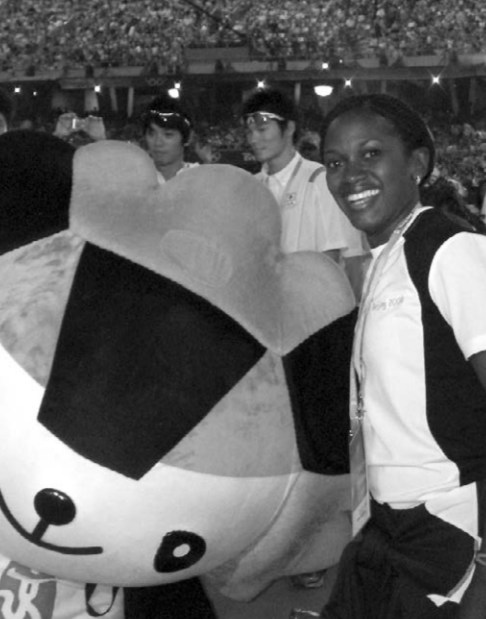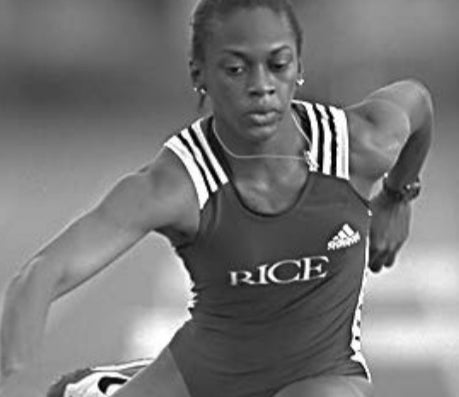Full coverage of Rice at the 2024 Olympics
As the 2024 Paris Olympics come to a close, many gifted athletes from around the world learn from the triumphs and adversity that come with competing at the highest level.
Few know this better than Andrea Blackett, former star Rice University athlete and two-time Olympian.
In her time at Rice from 1993-97, Blackett set school records in both the 100-meter and 400-meter hurdles. She finished her collegiate career as a six-time All-American, including back-to-back turns in the 400-meter hurdles in 1996 and 1997. She qualified for the NCAA championships all four years.

Blackett was inducted into the Rice Athletic Hall of Fame individually in 2005 and again in 2007 as a member of the 1997 NCAA champion 4x400 relay. A veteran international competitor, Blackett represented Barbados in six IAAF World Championships. She qualified for the final four times, and in 1999 she placed fourth.
She competed in the 2000 Sydney Olympic Games, qualifying for the semifinal of the 400-meter hurdles and she competed in the 400-meter hurdles at the 2004 Athens Olympics. Blackett has a personal best of 53.36 in the 400-meter hurdles, which is also a national record for Barbados. She set the Barbados 100-meter hurdles record of 13.39 in 2003.
Blackett holds an undergraduate degree from Rice and a master's degree in hotel management from the University of Houston. She returned to Rice to coach track and field for 11 years, and now is the associate men's and women's track and field coach at Azusa Pacific University.
Even amidst all of her successes, Blackett ran into adversity during the Olympic Games, sustaining injuries and fighting through pain to compete.
In a Q&A interview with Rice News, Blackett discusses what it’s like to reach your potential as an athlete and battle through injury on the largest stage, as well as how those experiences can make you a better coach:
Tell me a little about your upbringing and what drew you to compete in track and field.
“I grew up in Barbados, a very small island in the eastern Caribbean — 265,000 people, if you can imagine that. I'm sure we're no bigger than the 610 Loop. My brother (Nigel) actually started running first, and I went to the same secondary school he went to. To me, he was so cool because he was the athlete in school. I started running because I wanted to follow in his footsteps. I played sports year round, but track is just the one that stuck. I started off running the 200 and the 400, and that was pretty much the beginning of my journey.”
“I just love to run. I enjoyed other sports, but there was a point where my secondary school coach pulled me aside and was like, ‘Okay, this is all cute that you play netball and tennis, but you're not getting the tennis scholarship. Let's be honest here.’ It was time to dial in and see where we could go with this track thing. So I really give my coach a lot of credit for teaching me about track and field in general and planting the seed in my head that this is not just fun, you can actually move up levels in the sport.”
Talk about what you do now, and what led you to your journey as a coach.

“Once I graduated from Rice and I started my professional career, Victor Lopez was the head coach at the time. I had just finished my master's at the University of Houston, and thought I should start getting plugged in with the team and volunteering. So I would train in the morning, and then I would come back in the afternoon and help out. I think starting to coach really helped me with my training skills.
“I was a volunteer coach for Rice, and then when coach Lopez retired and coach (Jim) Bevan took over, he asked me if I would consider coming on staff and being a full-time coach. I really never thought about being an actual coach. So when he brought it up to me, I started thinking ‘let's give it a try.’ I spent 11 years on staff at Rice, and it was fantastic. An opportunity came for me to come out to (Los Angeles) and coach, and I think it was good for me to get away from what I knew, because I was getting too comfortable. And it's been tough, but I've grown and I've learned so much, and I'm just super happy to be able to do what I love as a career.”
What led you to Rice, and what was your time on South Main like?
“Coach Lopez literally flew down to Barbados and recruited four of us. We technically graduate at 16 in Barbados, and then I was doing a post high school program that was supposed to be two years, and I finished my first year when coach Lopez met us. It just seemed like the perfect spot, the perfect opportunity. He was from the Caribbean, so I knew he understood the challenges of Caribbean athletes coming to the U.S. I definitely did not know what I was getting myself into, and that probably was a good thing. But the experience at Rice was unbelievable. I mean the way I was challenged, both in the classroom and on the track, I really think it gave me that foundation. And when I graduated, I believed that I was capable of whatever was thrown my way. That's just a tool you really can't pay for.”
What was it about Rice that led you back to coach here?
“I just believe in Rice athletics. I think we attract great people. I think the environment is one where it challenges people, and it brings the best out of people. And I just believe that it's a special and unique place. With the combination of academics and athletics, it's really a place where you can excel at both. And I'm enamored with that.”
What's the first thing that comes to mind when you think about your experience at the Olympics?
“I think the first thing that comes to mind was that very first moment during the opening ceremonies in 2000, when you walked into the stadium. It was just electric. It was that moment that you never forget, walking in the stadium and seeing all those people and the energy and the lights. It was just fantastic. That is probably the one memory that I'll take with me forever.”
What was your first time in the Olympics like, and how did your second time compare?

“The first time, I was physically in really good shape, so it took on a different energy. The second time, I had had some injuries that year, so I kind of knew I was not in the best shape. That puts you in a weird spot because you're still in it and you're still trying to do the best you can, but you know in the back of your mind that the preparation hasn't gone as well as it could have or should have. So my second experience wasn't as great as my first one, just simply because I knew I was not in the kind of shape that I'd been in in the previous years.
“But when you're an athlete and you're preparing for the Olympics, you always have that hope. Even though I knew I wasn't physically fit, I was like, ‘I have to go there and just see what happens,’ and give myself a shot. You always have to put yourself in a position to have a shot because you never know what can happen.”
How do you think those experiences molded you as a person moving forward in life?
“Those experiences teach you that you just have to keep going. God often throws things your way to see how badly you want it and to see what you're made of. And you just have to keep working through things. I think it's also helped me in my coaching journey because I can relate to athletes when they're hurt. You tell them that you just have to keep working through it, trust God's plan and hope for the best. Sometimes it doesn't turn out your way, but you just have to get up the next day and keep going.”
What was it like for you being able to represent not only your country, but also Rice, on such a big stage?
“It's fantastic. There are not a whole lot of Rice athletes who are Olympians, so it definitely gives you a sense of pride to put Rice on the international stage. You wear your Rice gear in the village and people are like ‘Rice? What’s that?’ So, it gives you a sense of pride to be able to tell people about Rice and put us on that world stage.”
What's your most memorable experience from the Olympics?
“Really just warming up and getting ready, taking in the fact that this is happening. This is real. You are an Olympian, you are about to just perform in front of 60,000 people, and there's a moment when it hits you and you're like, ‘Okay, you're ready for this. You prepare for this. Let's do it.’”
Talk a little bit about what it means to you to be an Olympian today and how you carry that with you.
“I've been looking forward to the Olympics for the last six months because it's something that I've been a part of, and I know what it means to people. I know how it can change people's lives. Sometimes I get choked up when I see people doing things they've never done before. It's just a special event, but it's even more special knowing that I've been a part of this at one point. So it definitely makes me so excited to watch and take it all in.”
What is it like watching the Olympics right after you finished competing, and what is it like watching now?
“So 2008 was a little rough for me because I actually started training in 2008, and then I had a fall at practice that completely wiped me out. So it was a little weird. I pulled out from the team, and then I got asked to be a coach on the team, so I actually did get to go to the Beijing Olympics and was able to be there with Funmi Jimoh, which was totally cool. But it was a weird feeling knowing that was supposed to be my last one. But I also got a sense to just trust God's plan. ‘He's taking you in a different direction, and you just need to see what's next in your life.’”
Talk about how being an Olympian has influenced your career and the perspective that it gives you as a coach.
“I think it definitely gives me confidence when I'm talking to athletes. I have so many experiences, not just personal experiences, but I've seen so much being out there at the Olympics — being in the warm up area and watching the best of the best do what they do. You definitely pick up a lot of skills, a lot of knowledge, and I'm able to pass that on to other people. That gives me a huge sense of pride. It's part of why I love what I do.
“I also tell my athletes it's not necessarily about being an Olympian. Not everybody can be an Olympian, but it's about challenging yourself to be your best. And that's the thing that I always emphasize — whatever your best is, that's fine. But you have to get yourself there. If that's being an Olympian, cool. If that's being a national champion, that's cool, too. Or if it's just a conference champion. Whatever it is, you need to be working every day to be your best.”

